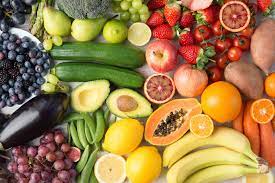Introduction:
A balanced diet is essential for maintaining good health and overall well-being. It provides the necessary nutrients, vitamins, minerals, and energy needed for bodily functions and growth. A well-rounded and thoughtful approach to diet can help prevent various health issues and promote longevity. In this article, we will explore the components of a balanced diet and tips for achieving a healthy and fulfilling dietary lifestyle.
Understanding a Balanced Diet:
A balanced diet comprises a variety of foods in appropriate proportions to meet an individual's nutritional needs. It typically includes fruits, vegetables, whole grains, lean proteins, and healthy fats. Striking the right balance among these food groups ensures the intake of essential nutrients for optimal health.

Essential Food Groups:
a. Fruits and Vegetables:
These are rich in vitamins, minerals, and fiber. Aim for a colorful variety to ensure a diverse range of nutrients.

Whole Grains:
Foods like brown rice, whole wheat bread, and quinoa provide essential fiber and nutrients for sustained energy and digestive health.
Lean Proteins:
Incorporate sources like poultry, fish, legumes, tofu, and nuts for protein, which is crucial for muscle repair and growth.
Dairy or Dairy Alternatives:
Include low-fat or fat-free options for calcium, vitamin D, and other essential nutrients that support bone health.
Healthy Fats:
Opt for sources like avocados, nuts, seeds, and olive oil to fulfill the body's fat requirements while promoting heart health.
Portion Control:
It's important to be mindful of portion sizes to prevent overeating. Using measuring utensils and being aware of recommended serving sizes can help in maintaining a balanced diet.
Hydration:
Water is fundamental for bodily functions and helps in digestion, temperature regulation, and nutrient absorption. Aim for at least eight cups of water per day and adjust based on your activity level and climate.
Moderation and Variety:
Moderation is key in any diet. Avoid excessive consumption of sugary, fatty, or processed foods. Instead, focus on a diverse range of nutrient-rich foods to ensure a balanced intake of essential nutrients.
Meal Planning:
Plan meals in advance to incorporate a variety of foods from different food groups. Include a mix of colors, textures, and flavors to keep meals interesting and nutritious.

Balanced Diet and Weight Management:
A balanced diet aids in weight management by providing adequate nutrition without excessive calories. Combining a balanced diet with regular physical activity supports a healthy weight and overall wellness.
Consult a Professional:
Before making significant dietary changes, consult a healthcare professional or registered dietitian. They can provide personalized guidance based on your individual health needs and goals.
Conclusion:
Achieving a balanced diet is about making thoughtful food choices that provide the necessary nutrients for your body to function optimally. By incorporating a variety of foods from all food groups, controlling portions, and staying hydrated, you can promote good health, maintain a healthy weight, and enjoy a fulfilling and energized life.


You must be logged in to post a comment.